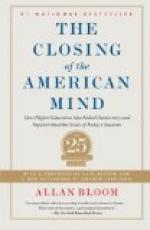That is why peace can never be an end: it, too, is merely a condition or means. The question is, what do you do with your peace, for peace may mean merely sloth and cowardly ease, where war may mean unselfish heroism. That is what the peace promoters forget. War has its brutalities, and terrible indeed they are: unleashed hate, lust, cruelty and revenge; but war has its heroisms. It calls out the devotion to something higher than the individual from even the commonest of men. To-day all over the earth, ordinary men are quietly going out to probable death or mutilation in its most horrible forms, and going for the sake of an ideal larger than themselves. Women are doing even more than that. For it is not so hard to die, but to send out those you love, dearer than life itself, to almost certain death—that, indeed, is difficult, and women are doing it everywhere with a smile on their lips and choked-back tears.
Peace, on the other hand, has its virtues: the softening and refining of life, gradual development of sympathy, achievement of comfort and beauty; but peace has its vices. In times of peace and prosperity there seems to be no great cause at stake. Of course, always it is there, but we do not see it. We become increasingly absorbed in selfish interests, in the good of our immediate family. Thus petty, time-serving selfishness is the vice peculiarly characteristic of times of peace and prosperity. Consider, for instance, the spirit of France during the closing years of the nineteenth century, and at the present dark, but pregnant, hour of destiny.
Thus the question is not whether you have peace or war, but what you do with your peace or war. It is not whether you are rich or poor, but what you do with your riches or poverty.
Suppose we were able to reconstruct our entire social and industrial world, so that every human being would have plenty to eat, plenty to wear and a comfortable house to live in: would we have the kingdom of heaven? Not necessarily: we might have merely a comfortable, well-decorated pig-sty, if men lived to nothing higher than pigs. “Man cannot live by bread alone,” important as bread is, but by dedication to the things of the spirit.
Thus there must ever be the capacity for self-forgetfulness, self-sacrifice, the dedication of life to supreme aims, but that does not mean the dedication of man to the institution. Rather it is the consecration to the welfare of humanity. Man for the State means autocracy and imperialism; Man for Mankind is the soul of democracy. That is the ideal to which we must rise, if democracy is to prove itself worthy to be the form of human society for the great future.
This ideal is realized through many lesser forms and instruments, but always with the same final test. The family, for instance, is one of these lesser forms, and the subordination of the individual to the family unit is just. Thus there is a measure of right in seeking first the interest of the family group; but when this is sought to the end of special privilege and debauching luxury, against the welfare of all, it becomes, as we have seen, an evil.




